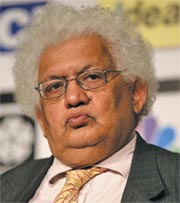During your very distinguished
and illustrious career you would
have witnessed several economic
crises and for many you would have
been consulted. How do you describe
the global economy’s mood right
now?
The global economy has had a 15-
year growth experience between 1992
and 2007. Now it is in a recession but
the recession has not become a
depression as many feared. There is a
double coincidence of a financial
crisis and a real economy slowdown
which is unusual. Since the war, we
have had a crisis in the 1970s, the
1980s and the early 1990s. The first
two were caused by declining
profitability plus the oil price rise.
The last one was due to the need for
restructuring as the world was
preparing for globalization.
What did the recent US financial
crisis mean to you and to your
profession?
Nothing much. The profession has
been criticized and is divided. Many
blame the financial crisis on the
economists’ assumption of themarket
being able to self-adjust to avoid
crises and on rational expectations
etc. I myself believe that the
Economics profession is neither so
naïve as people think nor restricted to
macro and finance theorists. The
central bankers of USA and UK are
both distinguished macro theorists
and are in the mainstream.The fact
that they have been able to respond
magnificently and innovatively
shows the power of economics not its
failure.
How do you think India has
managed the crisis? Which country
do you think has responded /
managed the crisis quite remarkably
well?
India has had only a growth
slowdown not a serious recession. It
had inflation in which it could not
manage quickly enough and its
rebound from growth is still fragile. Germany and France have managed
well.
What were the prime reasons for
US financial crisis that has engulfed
global economy forcing everyone to
term this crisis as worse than the
Great Depression?
A combination of cheap credit,
thanks to the recycling of financial
imbalances from China to the US, the
risk proneness of financial market
institutions which mistakenly
thought that the new financial
instruments such as CDS and CDOs
eliminated risk, and the lack of
productive and profitable investment
opportunities after the collapse of the
dotcom boom which directed the
cheap credit to the housing market
based on an expectation of continuing
price inflation in that market. It is not
worse than the Great Depression.
It is generally believed that
globalization is all about interplay
between 4Cs – credit markets, capital
markets, currency markets and
commodity markets. Was the
imbalance created between these four
markets in some way responsible for
the financial crisis?
See my answer above. The
commodity market flared up as the
securities market slowed down
towards the end of 2007 beginning of
2008. This led to inflationary
pressure thanks to the oil price
bubble.
ï€ Who do you think should
squarely be blamed for getting the
world into such a catastrophic mess –
the Wall Street firms with their
insatiable desire for ‘derived’ returns,
or the regulators or the governments?
What was it about the regulatory
framework that contributed to the
crisis?
We all enjoyed the boom while it
lasted and borrowed money from
banks.We are all to blame since none
of us stopped to think how long a
boom such as this could last. But
cheap credit was at the root of the
crisis.
A large section of people believe
that the crisis was allowed to become
bigger because of policymakers’ (both
at the companies and the
government) indecision. And the full
blown crisis is just a price for
indecisive governments and
indifferent companies, the argument
goes. Do you see any merit in this
argument?
There is always a lag between the
problem occurring, the policy makers
seeing it, proposing a solution and
then the solution having an impact.
The policy makers acted swiftly
when banks began to have problems
as in the case of Northern Rock or
Bear Stearns. But they did not foresee
the problem of overleveraging and
underpricing of risk. Even if they did
they were reluctant to say so in case
they caused a recession rather than
just slowed down a boom. Alan
Greenspan confessed to believing that
the market will solve its own
problems. For a right-wing libertarian
this was too much in my view. Even
if he did so then he should have
opposed any bailouts.


